Friday May 21 - 21h15m
Enroute to China and I honestly don't know how you regular travellers do it. I have sat through 2 full length movies, countless news and short films, rubbery chicken with the ever so elegant flavour of cough medication, and I am only 8 hours into my 12 hour flight to Japan. A 1 hour waylay there and then 3 more hours on Air Nippon to Beijing. Where are the damned teleportation devices?
--------------------
It is now 10:37pm EST, and I have been on this plane for 9 hours and 37 minutes. We are 1339 miles from our destination and I am going stir crazy. Can't sleep like most people because the seats are so small. I have gone to pee over 9 times. I have nothing better to do but wonder what they do with all that piss etc? Do they just release it while in flight? Puts a whole new spin on "raindrops are falling on my head". Anyhow, 3 hours and 37 minutes to go.
-------------------
May 22 20h05m
After arriving at Beijing Airport, we were greeted by our tour guide Jeffrey who gave us the essentials on taxi and road etiquette, which I gathered was close to none. When you have 1.5 billion people travelling en masse, it makes it difficult to gauge what rules to follow - rickshaws, millions of cars, millions of bikes and millions of pedestrians. It was a wonder that I didn't see any accidents. We arrived at our hotel Marco Polo intact, and we settled in for a jet-lagged sleep. We were up at 5:30am, unable to sleep further.
-------------------
May 23
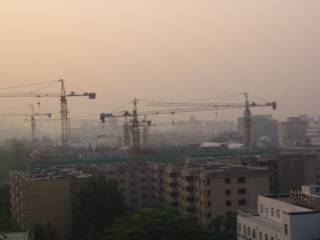
Beijing is this incredible combination of modern and old. Cranes and new buildings literally dot the sky in every direction as far as one can see. Besides a short stint in Chinese studies in university, I am amazed and somewhat dissappointed with my lack of education about China. I half expected to see Communism and gray garbs still rampant. Instead, Beijing is modern and bustling with activity. It hosts 13 million, which is one third Canada's population and most seem to be in cars or motorbikes. I am told that there are 1,000 new cars driven onto these busy streets each day.
We have visited Tian'an'men Square, the Forbidden city and the Temple of Heaven. These are all architectural emblems of an ancient society, built by Emperors and dynasties that make up the history of China. Our last stop was the Lamas temple, an incredible Lamas Buddhist temple where I received much needed tranquility after a rather exhausting tour of the city.
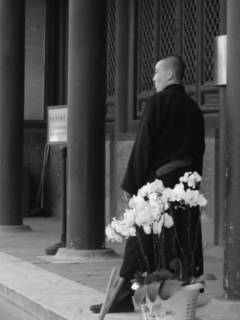
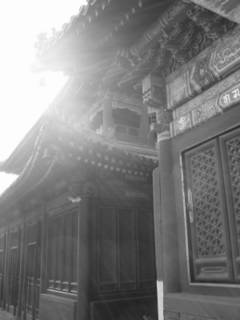
--------------------
May 24
Visited the Summer palace that rests on Kunming Lake, where the Dowager Empress built a palace to entertain her during the summer (the funds were taken from the Navy reserve, and resulted in the eventual demise of China to the Japanese). I have to say the place is gorgeous, but is packed with Chinese people pushing and spitting just about everywhere - I have gotten somewhat used to the nastiness - a cultural social difference which I will simply have to bear with as a foreigner to this country. This is one realisation that I have come to with some difficulty - That as a Chinese person raised in a Western country, I am looked at as a foreigner. I don't speak Mandarin (Putong Hua) very well and as such it is difficult to communicate. Additionally, the rules of western society, do not necessarily apply to this part of the world and I am fast seeing that my stereotypes and prejudices are something I need to work on.
Enroute to China and I honestly don't know how you regular travellers do it. I have sat through 2 full length movies, countless news and short films, rubbery chicken with the ever so elegant flavour of cough medication, and I am only 8 hours into my 12 hour flight to Japan. A 1 hour waylay there and then 3 more hours on Air Nippon to Beijing. Where are the damned teleportation devices?
--------------------
It is now 10:37pm EST, and I have been on this plane for 9 hours and 37 minutes. We are 1339 miles from our destination and I am going stir crazy. Can't sleep like most people because the seats are so small. I have gone to pee over 9 times. I have nothing better to do but wonder what they do with all that piss etc? Do they just release it while in flight? Puts a whole new spin on "raindrops are falling on my head". Anyhow, 3 hours and 37 minutes to go.
-------------------
May 22 20h05m
After arriving at Beijing Airport, we were greeted by our tour guide Jeffrey who gave us the essentials on taxi and road etiquette, which I gathered was close to none. When you have 1.5 billion people travelling en masse, it makes it difficult to gauge what rules to follow - rickshaws, millions of cars, millions of bikes and millions of pedestrians. It was a wonder that I didn't see any accidents. We arrived at our hotel Marco Polo intact, and we settled in for a jet-lagged sleep. We were up at 5:30am, unable to sleep further.
-------------------
May 23

Beijing is this incredible combination of modern and old. Cranes and new buildings literally dot the sky in every direction as far as one can see. Besides a short stint in Chinese studies in university, I am amazed and somewhat dissappointed with my lack of education about China. I half expected to see Communism and gray garbs still rampant. Instead, Beijing is modern and bustling with activity. It hosts 13 million, which is one third Canada's population and most seem to be in cars or motorbikes. I am told that there are 1,000 new cars driven onto these busy streets each day.
We have visited Tian'an'men Square, the Forbidden city and the Temple of Heaven. These are all architectural emblems of an ancient society, built by Emperors and dynasties that make up the history of China. Our last stop was the Lamas temple, an incredible Lamas Buddhist temple where I received much needed tranquility after a rather exhausting tour of the city.


--------------------
May 24
Visited the Summer palace that rests on Kunming Lake, where the Dowager Empress built a palace to entertain her during the summer (the funds were taken from the Navy reserve, and resulted in the eventual demise of China to the Japanese). I have to say the place is gorgeous, but is packed with Chinese people pushing and spitting just about everywhere - I have gotten somewhat used to the nastiness - a cultural social difference which I will simply have to bear with as a foreigner to this country. This is one realisation that I have come to with some difficulty - That as a Chinese person raised in a Western country, I am looked at as a foreigner. I don't speak Mandarin (Putong Hua) very well and as such it is difficult to communicate. Additionally, the rules of western society, do not necessarily apply to this part of the world and I am fast seeing that my stereotypes and prejudices are something I need to work on.
For the afternoon, we take a long bumpy drive along precarious mountain roads from Beijing to Mutianyu, to see the Great Wall of China. It is immense and foreboding. The wall stretches and winds across the mountains and into the clouds. I feel as though I am riding a dragons back. The locals pester us to buy things and follow us along our whole walk, waiting and literally begging us to buy something. They wear torn ragged and dusty clothes, and will haggle to get any money. I feel bad but get postcards for 3 RMB (CAN$.50) and a shirt I haggled from 60RMB to 10RMB (CAN$1.50)
--------------------
May 25
We are in Nanchang, a 2 hour flight from Beijing, and I can really see the impact of economic growth in an otherwise rural region. Nanchang is the birthing ground for the Communist-led uprising of August 1, 1927, but the marks of the Communist era are all but erased. The population is 1.5 million and is considered a small city. The city is dense, dirty and compact, and very humid and hot. The people are robust with a strong country-folk character. They are upfront, loud and direct. They are simple in many ways, that only one can understand when one speaks to them. They have grown from a river side rural and agricultural life to this bustling city. Hotels and franchises abound. Their simplicity became ever so evident when speaking to a local girl who we met through our local contact. She tells me she is from the country where her family still grows rice. She has all the modern accoutrements - has dyed red hair, has a cell phone, yet has never been out of this region, never seen a plane or a train.
I am here to spend a few days with my 95 year old grandfather and 96 year old grand aunt (his sister). They don’t get along well, and this portion of the trip is becoming tedious and painful.
----------------
May 26
We are headed for Longshan today. The drive is 4 hours and it is my first experience in seeing the country-side and the Agrarian lifestyle. The countryside hasn't changed all that much and I imagine myself in the old feudal dynastic society. Verdant fields of rice paddies, water bogged with mud brick homes and thatched clay tiled roofs. The only ties to the modern world are the occasional power lines and paved road that cuts through the landscape. Even in these rural areas there are tones of people, all working and toiling in the fields. I am humbled and feel the strength of these people. Their dark skin and dirty hands show their endurance and strength. Most live in mud clay homes or squat square structures. The countryside is hot hot hot. Humidity is the norm for this water bogged country - fed by 2 major rivers, the Chiang Jiang (Yangzi River) and Huang He (Yellow River).
Rice paddy fields, shanty towns, and beautifully carved mountains cover this landscape. I am in awe at the beauty and serenity of these sunny green pastures and looming mountains.
We reach Long Fu Shan (Dragon Tiger Mountain) and ride down the river in a very cool bamboo raft. 2 guides take us downstream and show us the Hanging Burial Caskets that are known for this region. On high cliffs surrounding the river are naturally carved niches and in them you can see burial caskets of the local ancestral people, placed seemingly precariously within.
----------------
May 29
We leave Nanchangs busy train station and settle into our 4 person 'soft seat' cabin, which cost 127RMB ($22can) Soft seat refers to sleeper cots, which are comfy and fairly clean. The trip is 9 hours, but they pass nicely with great views of the landscape (Definitely would recommend this mode of travel in China). Mind you the toilets again are just holes in the floor. Therefore, no shitting or pissing when at a station or you'll splatter some poor unsuspecting fool boarding or exiting the caboose.
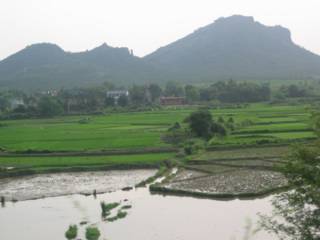
Not everything was beautiful and amusing. On our trip, we witnessed the true slums of China in the steel manufacturing cities. People toiled in these remote towns, where coal burning produced dark clouds and flames that burned the skies. The homes were no more then a mixture of tin and bamboo shacks set up beside these factories. I always knew how fortunate I was, but seeing children play in these dirty slums and watching their mothers wash and prepare food in a dirty river simply brought tears to my eyes.
---------------
May 29-31
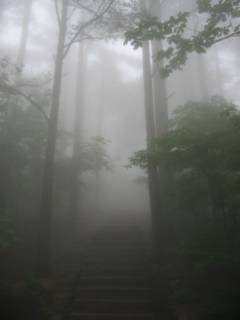
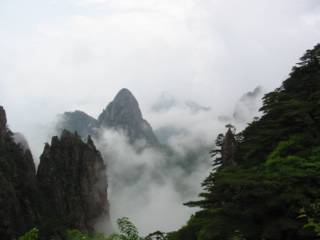
We arrived in Huangshan (Anhui Province) the home of my ancestors, late on the 30th. It is a major Agrarian society with its wet, foggy and temperate climate - with rice and tea being major exports. Green tea is specially grown here on steep slopes 800 ft above sea level, where they are continually covered in mist and rain. We have taken the Cable car up Huangsan (Yellow Mountain) and I am completely blown away by the beauty of this landscape. This is the China I have seen in paintings and movies (most recently in Crouching Tiger, Hidden Dragon). I have been looking forward to this part of the trip and am not dissappointed. The mountains are old and steep and we have taken many hikes through fog and mist filled forests. I can understand why this place has produced so many poets, painters and scholars.
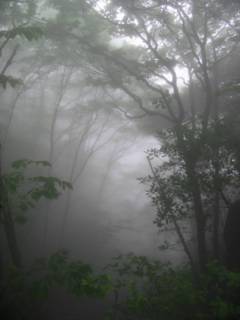
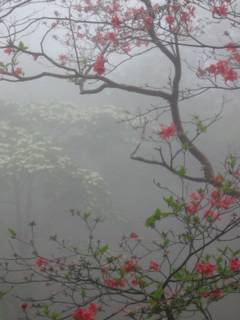
Unfortunately this scenic attraction has been over run by tourists who scream and shout, led by tour guides with megaphone speakers to herd their flocks. I am upset by the lack of respect that they have for this place. I suppose this is my Western sensibility again, but I am finding the Chinese people of now quite the contrast of the china of past. History and poems have always depicted the Chinese and the culture as dignified, quiet, serene and beautiful. I haven't found much of that during my trip, but I can't possibly understand what living in a populated society like this would do to me. The sheer amount of people in China may explain the consant rush. Everyone is looking to get their job or task done first, they are looking to get that empty seat on the bus or train. This makes it a very busy and seemingly impatient society.
China has gone through a tumultuous 100 years and I have spoken and learned a lot about what the Cultural Revolution has done to many of the citizens - none of it good. I have witnessed impoverished porters walking up hundreds of steps, bringing provisions to the hotels above. They have hard looks on their faces, torn ragged clothes, and grunt with every step they take. They not only carry the weight of the world, but bamboo poles that carry 60 to 95 kilos of weight across their backs (they get paid by the amount of weight they can carry). It is their way of life and know they have no option but this to feed their families.
-----------------
May 31-June 02
We have taken the cable car down the mountain and are walking the 500 year old streets of Tunxi. The old city has been repaired and you can see the beautiful frames and wood structures that are typical of the Anhui people and this region.
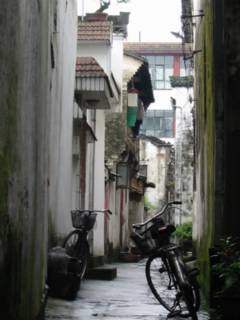
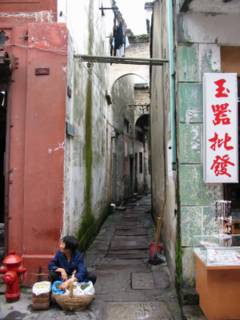
Our driver takes us to Hangzhou, which is a 4 hour drive along very bumpy country back roads. They are building a major highway and it should be finished by the end of the year. I suppose Communism has its merits, in that it can get things done very quickly (no one to argue with) and it also has an immense resource of people to do the work.
Hangzhou is the first modern city in China that I have seen that makes me feel more at ease. People are more courteous and drivers are less erratic. The shopping here is great as well. We visit my families' ancestral grave and spend the time walking around the city and eating local delicacies (none of which included civet cats or dog). I have weighed myself and I have gained 10 pounds while here. Those of you who know me well, know that is an enormous accomplishment for me.
------------------
June 02-June 05
We have taken the train to Shanghai, also known as the Pearl of the Orient, Whore of the East. Shanghai has been dragged through an incredibly chequered past of invasions and occupations. This created a wild city of opium dens, underground gambling joints, brothels, gangsters and decadence, all brought to an abrupt end by the suffocating grip of Communist rule in the late 1940s. The city is now under the influx of a greater power-money, commercialism and growth. This place is quite unbelievable. The city is filled with skyscrapers, glass towers and high-end boutique shops and malls that sell Gucci, Lagerfeld, Louis Vuitton and other fancy shmancy garbs. I am not surprised to see that the hunger for wealth, money and power has taken Shanghai by its graceful throat. Sophistication, wealth, modernism and success are on everyone’s mind. The city is one vast shopping spree. Foreigners abound everywhere and Shanghai is once again taking its place as the pearl of the Orient.
We have spent days here and visited family and many tourist attractions. Took the Maglev train from the city to the airport in 8 mins (428km/hour) and it was a wicked ride.
-----------------
China has turned out to be a rollercoaster of experiences and emotions. I can safely say that I have ridden the Golden Dragon, but it has been emotionally taxing and I have discovered many new things about myself and the microcosm I call home. I have enjoyed my experience and personal growth while here, but am glad to return to my home. China may be my roots, but I have been transplanted and enjoy the soil here in Canada, and truly appreciate what I have more so then I could ever have imagined.
--------------------
May 25
We are in Nanchang, a 2 hour flight from Beijing, and I can really see the impact of economic growth in an otherwise rural region. Nanchang is the birthing ground for the Communist-led uprising of August 1, 1927, but the marks of the Communist era are all but erased. The population is 1.5 million and is considered a small city. The city is dense, dirty and compact, and very humid and hot. The people are robust with a strong country-folk character. They are upfront, loud and direct. They are simple in many ways, that only one can understand when one speaks to them. They have grown from a river side rural and agricultural life to this bustling city. Hotels and franchises abound. Their simplicity became ever so evident when speaking to a local girl who we met through our local contact. She tells me she is from the country where her family still grows rice. She has all the modern accoutrements - has dyed red hair, has a cell phone, yet has never been out of this region, never seen a plane or a train.
I am here to spend a few days with my 95 year old grandfather and 96 year old grand aunt (his sister). They don’t get along well, and this portion of the trip is becoming tedious and painful.
----------------
May 26
We are headed for Longshan today. The drive is 4 hours and it is my first experience in seeing the country-side and the Agrarian lifestyle. The countryside hasn't changed all that much and I imagine myself in the old feudal dynastic society. Verdant fields of rice paddies, water bogged with mud brick homes and thatched clay tiled roofs. The only ties to the modern world are the occasional power lines and paved road that cuts through the landscape. Even in these rural areas there are tones of people, all working and toiling in the fields. I am humbled and feel the strength of these people. Their dark skin and dirty hands show their endurance and strength. Most live in mud clay homes or squat square structures. The countryside is hot hot hot. Humidity is the norm for this water bogged country - fed by 2 major rivers, the Chiang Jiang (Yangzi River) and Huang He (Yellow River).
Rice paddy fields, shanty towns, and beautifully carved mountains cover this landscape. I am in awe at the beauty and serenity of these sunny green pastures and looming mountains.
We reach Long Fu Shan (Dragon Tiger Mountain) and ride down the river in a very cool bamboo raft. 2 guides take us downstream and show us the Hanging Burial Caskets that are known for this region. On high cliffs surrounding the river are naturally carved niches and in them you can see burial caskets of the local ancestral people, placed seemingly precariously within.
----------------
May 29
We leave Nanchangs busy train station and settle into our 4 person 'soft seat' cabin, which cost 127RMB ($22can) Soft seat refers to sleeper cots, which are comfy and fairly clean. The trip is 9 hours, but they pass nicely with great views of the landscape (Definitely would recommend this mode of travel in China). Mind you the toilets again are just holes in the floor. Therefore, no shitting or pissing when at a station or you'll splatter some poor unsuspecting fool boarding or exiting the caboose.

Not everything was beautiful and amusing. On our trip, we witnessed the true slums of China in the steel manufacturing cities. People toiled in these remote towns, where coal burning produced dark clouds and flames that burned the skies. The homes were no more then a mixture of tin and bamboo shacks set up beside these factories. I always knew how fortunate I was, but seeing children play in these dirty slums and watching their mothers wash and prepare food in a dirty river simply brought tears to my eyes.
---------------
May 29-31


We arrived in Huangshan (Anhui Province) the home of my ancestors, late on the 30th. It is a major Agrarian society with its wet, foggy and temperate climate - with rice and tea being major exports. Green tea is specially grown here on steep slopes 800 ft above sea level, where they are continually covered in mist and rain. We have taken the Cable car up Huangsan (Yellow Mountain) and I am completely blown away by the beauty of this landscape. This is the China I have seen in paintings and movies (most recently in Crouching Tiger, Hidden Dragon). I have been looking forward to this part of the trip and am not dissappointed. The mountains are old and steep and we have taken many hikes through fog and mist filled forests. I can understand why this place has produced so many poets, painters and scholars.


Unfortunately this scenic attraction has been over run by tourists who scream and shout, led by tour guides with megaphone speakers to herd their flocks. I am upset by the lack of respect that they have for this place. I suppose this is my Western sensibility again, but I am finding the Chinese people of now quite the contrast of the china of past. History and poems have always depicted the Chinese and the culture as dignified, quiet, serene and beautiful. I haven't found much of that during my trip, but I can't possibly understand what living in a populated society like this would do to me. The sheer amount of people in China may explain the consant rush. Everyone is looking to get their job or task done first, they are looking to get that empty seat on the bus or train. This makes it a very busy and seemingly impatient society.
China has gone through a tumultuous 100 years and I have spoken and learned a lot about what the Cultural Revolution has done to many of the citizens - none of it good. I have witnessed impoverished porters walking up hundreds of steps, bringing provisions to the hotels above. They have hard looks on their faces, torn ragged clothes, and grunt with every step they take. They not only carry the weight of the world, but bamboo poles that carry 60 to 95 kilos of weight across their backs (they get paid by the amount of weight they can carry). It is their way of life and know they have no option but this to feed their families.
-----------------
May 31-June 02
We have taken the cable car down the mountain and are walking the 500 year old streets of Tunxi. The old city has been repaired and you can see the beautiful frames and wood structures that are typical of the Anhui people and this region.


Our driver takes us to Hangzhou, which is a 4 hour drive along very bumpy country back roads. They are building a major highway and it should be finished by the end of the year. I suppose Communism has its merits, in that it can get things done very quickly (no one to argue with) and it also has an immense resource of people to do the work.
Hangzhou is the first modern city in China that I have seen that makes me feel more at ease. People are more courteous and drivers are less erratic. The shopping here is great as well. We visit my families' ancestral grave and spend the time walking around the city and eating local delicacies (none of which included civet cats or dog). I have weighed myself and I have gained 10 pounds while here. Those of you who know me well, know that is an enormous accomplishment for me.
------------------
June 02-June 05
We have taken the train to Shanghai, also known as the Pearl of the Orient, Whore of the East. Shanghai has been dragged through an incredibly chequered past of invasions and occupations. This created a wild city of opium dens, underground gambling joints, brothels, gangsters and decadence, all brought to an abrupt end by the suffocating grip of Communist rule in the late 1940s. The city is now under the influx of a greater power-money, commercialism and growth. This place is quite unbelievable. The city is filled with skyscrapers, glass towers and high-end boutique shops and malls that sell Gucci, Lagerfeld, Louis Vuitton and other fancy shmancy garbs. I am not surprised to see that the hunger for wealth, money and power has taken Shanghai by its graceful throat. Sophistication, wealth, modernism and success are on everyone’s mind. The city is one vast shopping spree. Foreigners abound everywhere and Shanghai is once again taking its place as the pearl of the Orient.
We have spent days here and visited family and many tourist attractions. Took the Maglev train from the city to the airport in 8 mins (428km/hour) and it was a wicked ride.
-----------------
China has turned out to be a rollercoaster of experiences and emotions. I can safely say that I have ridden the Golden Dragon, but it has been emotionally taxing and I have discovered many new things about myself and the microcosm I call home. I have enjoyed my experience and personal growth while here, but am glad to return to my home. China may be my roots, but I have been transplanted and enjoy the soil here in Canada, and truly appreciate what I have more so then I could ever have imagined.
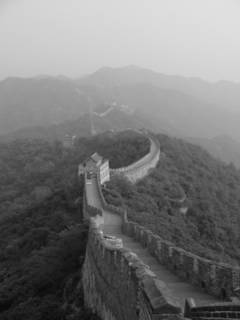
1 comment:
Great pictures! Would love to go one day!
Post a Comment